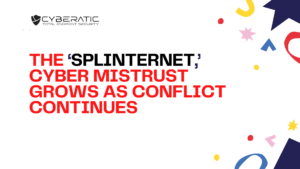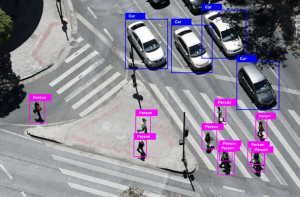How the Splinternet is Contributing to Cyber Mistrust:
Governments around the world are increasingly contributing to mistrust between countries, which can hurt both diplomatic efforts and business relationships. As governments become more adept at cyber espionage, the ability to trust foreign connections in the digital world becomes increasingly difficult. This phenomenon is best illustrated by the ‘splinternet’—a term coined by security expert Adam Segal to describe how national borders are influencing online activity and conflict between countries has translated into greater distrust online.

Splinternet Description:
There have been several incidents of cyber espionage and hacking by countries and groups in recent years, raising tensions between nations. The fact that there are active conflicts between some of these countries only exacerbates a situation that could otherwise be worked out diplomatically. For example, an attack on a country’s critical infrastructure (such as Iran’s nuclear reactors or Stuxnet) in which most or all clues point back to another country will only make it more difficult for those countries to come together diplomatically in the future.
Trend:
The Internet was supposed to connect us, but it’s actually dividing us. In a study of four countries — China, Germany, India and United States — researchers asked people whether they believed their fellow citizens were ready and willing to help them get online. People in all four countries underestimated how many fellow citizens had a positive attitude toward Internet use. These misperceptions were greatest in China, where two-thirds of respondents felt that their fellow citizens were not very or not at all willing to help get people online.
Additional Examples:
The information war, or InfoWars if you will, has taken a dangerous turn in recent years. Countries around the world have begun actively inserting themselves into a new battleground: cyberspace. However, as countries begin to interfere with one another within our technological infrastructures, tensions between nations continue to grow.
Why it Matters:
As online conflict among countries continue, so does mistrust among various elements of cyberspace. Due to fear of cyber attacks and espionage, countries are implementing strategies that put their citizens in a digital splinternet. That means less connectivity, which leads to economic and social isolation—which then potentially fuels more online hostility. In short: it’s a vicious cycle—and one that needs addressing sooner rather than later. In order for peace and security to take hold on a global scale, mistrust must be addressed within all levels of cyberspace.
Consequences:
A failure of a cyberattack doesn’t just mean that your business or government will be exposed. It could also have devastating, long-term consequences like political unrest, terrorism and even warfare. For example, Ukraine has already started experiencing turmoil because of an electronic information war with Russia—not surprising since it can be difficult to tell what’s real news and what isn’t in an information-saturated world. As humans continue interacting via computers and other digital devices, they may develop more cyberwar wounds as technology continues on its path of evolution.

An Example: Facebook and InfoWars:
In early August, Facebook announced that it had unpublished four pages run by InfoWars for violating its community standards. The fake news and conspiracy theory site—which was banned from Twitter in August 2017 and from Pinterest earlier in 2018—received numerous strikes for content that violated Facebook’s guidelines around hate speech, glorifying violence, and sharing disinformation. According to a statement posted on Facebook by Alex Jones himself, who runs InfoWars with his family: We will continue to look into further actions as warranted.
What is the Splinternet?
Even while Cogent’s service suspension to Russia does not fully abolish the country’s network connectivity, it does raise the wider question: What does this imply for the rest of the world?
The “splintering” of the global Internet has raised fears that divergent national rules and increasing sanctions as a result of escalating conflicts will lead to a disconnected patchwork of one of humankind’s greatest inventions. Russia has also announced censorship of various websites and social media tools.
If the “splinternet” continues to split, citizens, corporations, and government agencies might be unable to communicate with each other.
Growing Cyber Mistrust :

It’s becoming more and more difficult for Russian-related software to operate outside of Russia, as enterprises with an internet presence shut down or halt activities in Russia on a regular basis.
In a statement made on Tuesday, March 15th, the German federal cybersecurity agency BSI warned Germans against using Russian-based Kaspersky Lab antivirus software, as well as the general public.







